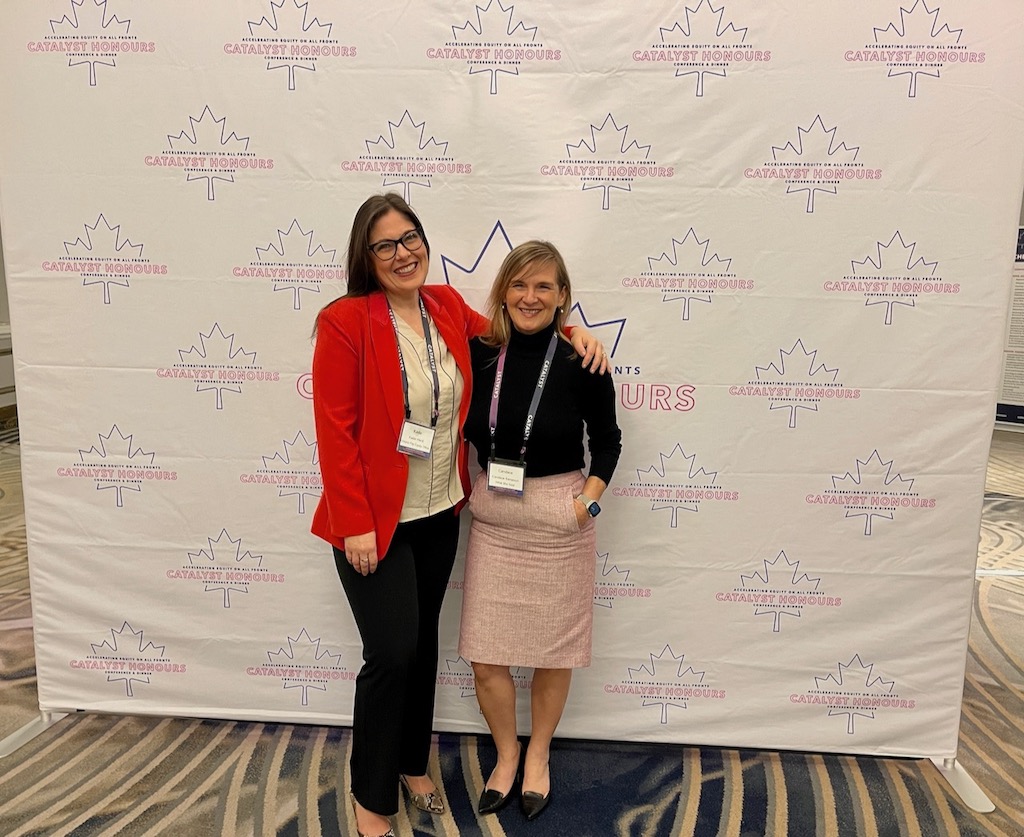Before attending the Catalyst Honours event in Toronto, I knew very little about Catalyst – a global nonprofit dedicated to championing women’s empowerment in the workplace. Little did I realize what I was missing out on. This event wasn’t just an eye-opener; it was a revelation. Surrounded by a community passionately striving for gender equality, I discovered a sense of belonging far removed from the often impersonal and toxic world of social media. It was a breath of fresh air, a reminder of the power of real connections and conversations in driving meaningful change.
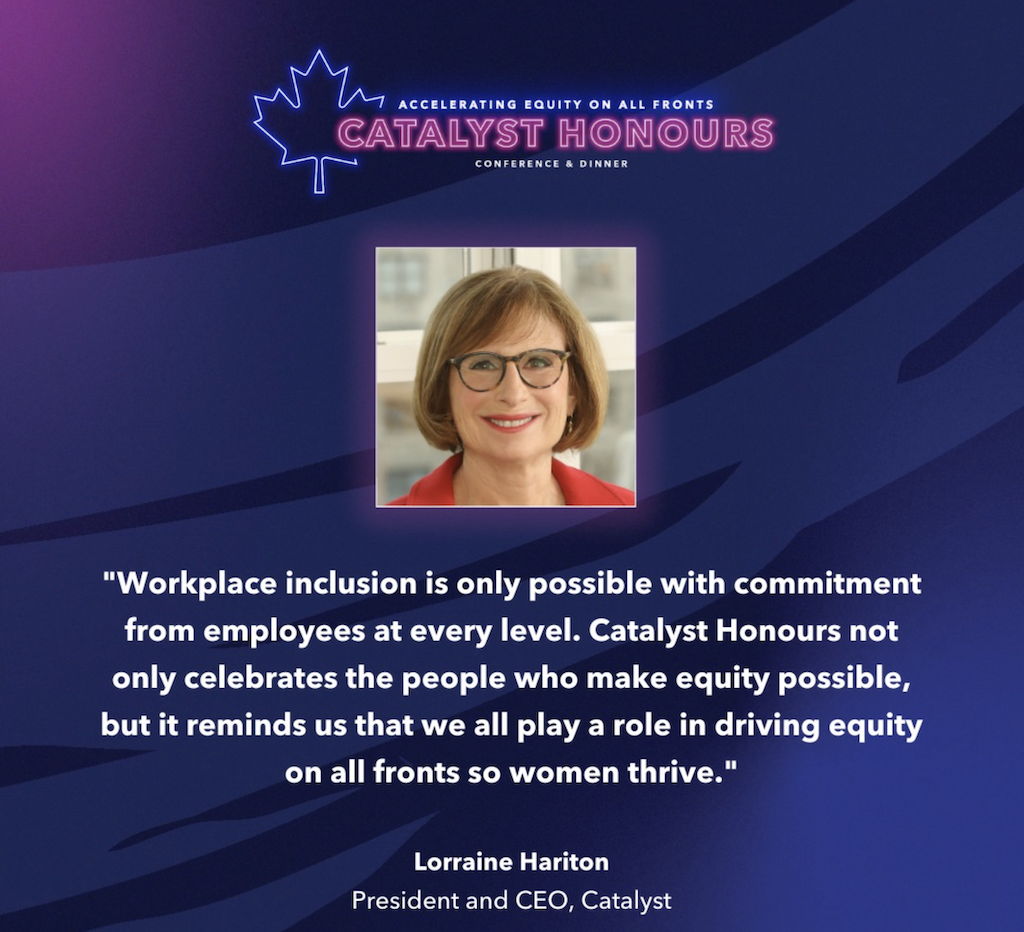
At What She Said, my mission is to amplify and elevate the voices of Canadian women from all walks of life – across every age, race, and socioeconomic status. Over the past three years, I’ve had the privilege of interviewing over 600 incredible women, each with her own unique story and perspective. Often, I find myself daydreaming about bringing all these inspiring women together in one room, imagining the energy and inspiration that would spark from such a gathering. The Catalyst event reminded me of why this dream is so important. It’s not just about sharing stories; it’s about creating a space where we can collectively bask in our collective awesomeness, learn from each other, and fuel our drive to make a difference.
The Significance of Women’s Empowerment in the Workplace
Women’s empowerment in the workplace is more than a goal; it’s a necessity for creating equitable and fulfilling work environments. We often hear sayings like “we work to live, not live to work,” yet the reality is that work forms a significant part of our lives. It’s not just about earning a living; it’s about finding purpose. In my own journey, even though I only report to myself, my work is my purpose. This sentiment was palpable in the room at the Catalyst event, shared by both the women and the male allies present. It’s clear that for many, their profession is not just a job, but a calling. This realization underscores why it’s crucial for our workplaces to be environments that enrich us, rather than drain us. Empowering women in the workplace is about more than fairness and equality; it’s about creating spaces where everyone can find meaning and fulfillment in their work, contributing to a more vibrant and productive society.

What Catalyst Does
Catalyst is an organization that lives up to its name by being a true catalyst for change. At its core, Catalyst is dedicated to accelerating progress for women through workplace inclusion. They tackle this through a variety of means: insightful research, practical tools, and a community that advocates for gender equality. In its mission to promote women’s empowerment in the workplace, Catalyst has become a beacon of hope and progress.
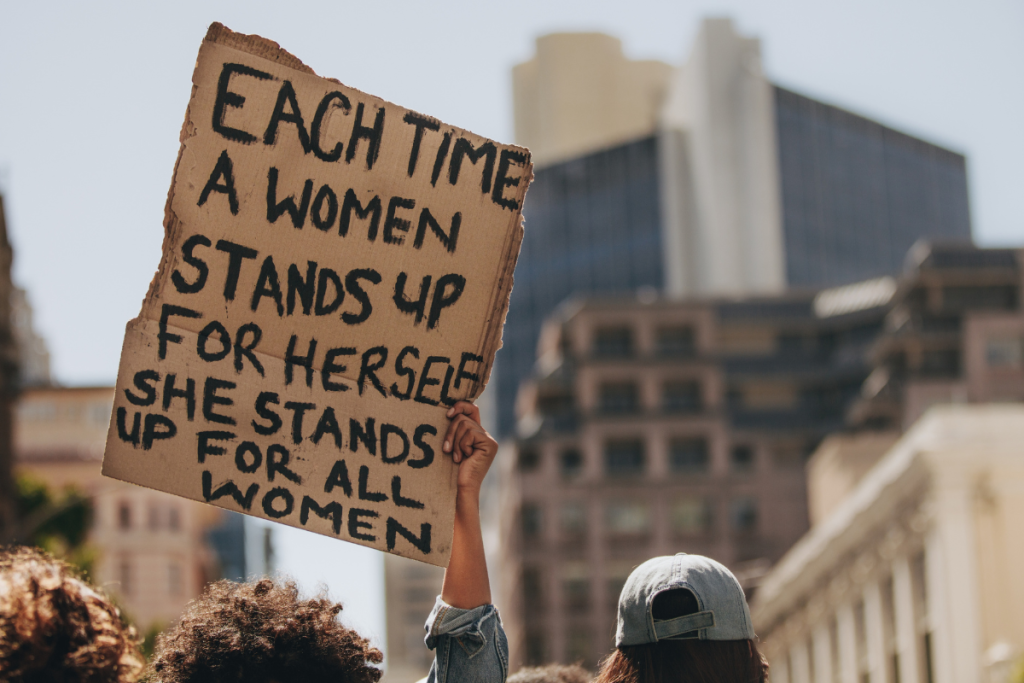
The name ‘Catalyst’ couldn’t be more appropriate. In chemistry, a catalyst is a substance that increases the rate of a reaction without itself undergoing any permanent chemical change. Similarly, Catalyst, the organization, sparks significant change in the corporate world. It accelerates the reaction towards gender equality and inclusive work cultures without being consumed by the challenges it faces. This name perfectly encapsulates their role in the corporate world – as an agent of rapid and sustainable change.
Honouring the Change-Makers
The Catalyst Honours event is a celebration of those who are leading the charge in creating inclusive workplaces. Each honouree’s story is a testament to the power of dedication and the impact of visionary leadership in fostering environments where women can thrive. Recognizing individuals who have significantly contributed to women’s empowerment in the workplace, the Catalyst Honours event celebrated the following change-makers.

- Bobby Gale is recognized for their impactful leadership and advocacy for gender-inclusive practices, LGBTQ2SIA+ inclusion, and mental and physical inclusivity at Loblaw. Over 17 years, Bobby has been a vocal advocate, notably for gender-inclusive bathrooms and the LGBTQ2SIA+ community, co-launching the Proud to be Me Podcast, Spectacular!, and promoting the use of pronouns in professional settings.
- Caroline Gayle, Managing Director at Accenture, is celebrated for her exceptional leadership in promoting diversity, equity, and inclusion (DEI) within the technology sector. She has been instrumental in opening doors for women in technology, championing their representation, and inspiring future leaders. Caroline’s initiatives include conducting comprehensive surveys to understand the experiences of women in technology, advocating for the advancement of women into senior leadership, and actively working to increase Black and Indigenous representation within Accenture.
- Jeahnette Cavaliere, Canada Country Manager at Wells Fargo, is honoured for her passionate advocacy for diversity, equity, and inclusion within the organization. She established the Canada Women’s Connection Employee Resource Network at Wells Fargo, the first of its kind in Canada for the company. Jeahnette has significantly increased women’s internal career mobility and representation within Wells Fargo through various initiatives, including the Women’s Canada Connectivity Program and the Gender Equity Initiative.
- Janine Tamboli, Director of Diversity and Inclusion at Maple Leaf Foods, is recognized for her strategic leadership in creating a more inclusive and equitable workplace. She has been instrumental in advancing gender equality within the company, introducing various programs, policies, and partnerships that significantly increased the representation of women at different levels. Janine’s initiatives have led to marked improvements in employee experiences, particularly in authenticity and equal opportunity.
- Taralyn Parr, Director of Diversity and Inclusion at McCarthy Tétrault LLP, is honored for her transformative work in the legal profession. She developed ‘Inclusion Now’, the firm’s comprehensive DEI strategy, and operationalized the Inclusion Now Office. Her initiatives have led to significant improvements in the firm’s culture, including a 25% increase in women in key client-facing roles and a 20% increase in people self-identifying as allies since 2019. Taralyn’s efforts have also focused on gender inclusion, particularly for trans, non-binary, and gender-diverse individuals, through policy updates, educational sessions, and inclusive self-identification options.
- Mona Malone, Chief Human Resources Officer and Head of People & Culture at BMO Financial Group, is recognized for her visionary leadership in advancing equity and inclusion. She led the creation of ‘Zero Barriers to Inclusion 2025’, a strategy focused on colleagues, customers, and communities. Mona’s initiatives include promoting self-awareness among leaders, introducing new digital resources for employee development, and mentoring young women. She also played a key role in developing BMO’s New Ways of Working strategy, which emphasizes a digital-first, hybrid work model and expanded benefits for families.
- Tyjondah Kerr is celebrated for her advocacy in representation and equitable opportunities for all. At OLG, she has been instrumental in implementing initiatives for significant change, focusing on storytelling to foster inclusion, leading key DEI initiatives, and partnering with talent acquisition teams to enhance recruitment strategies for greater diversity.
Calling People In, Not Out – Key Takeaways
One of the most profound realizations I had at the Catalyst Honours event was the power of vulnerability in leadership. In a world that often demands perfection and is quick to criticize, the true hallmark of effective leadership is the courage to admit ignorance and the eagerness to learn. It was inspiring to witness leader after leader on stage openly sharing their missteps and their journey towards getting it ‘right-ish’. We are, after all, continually evolving and learning.
The event, brilliantly hosted by Farah Nasser, a former guest on What She Said, was a symphony of insights and revelations. Farah’s charisma and depth added a unique richness to every discussion, turning the day into a cascade of enlightening moments that could have illuminated the entire city of Toronto.
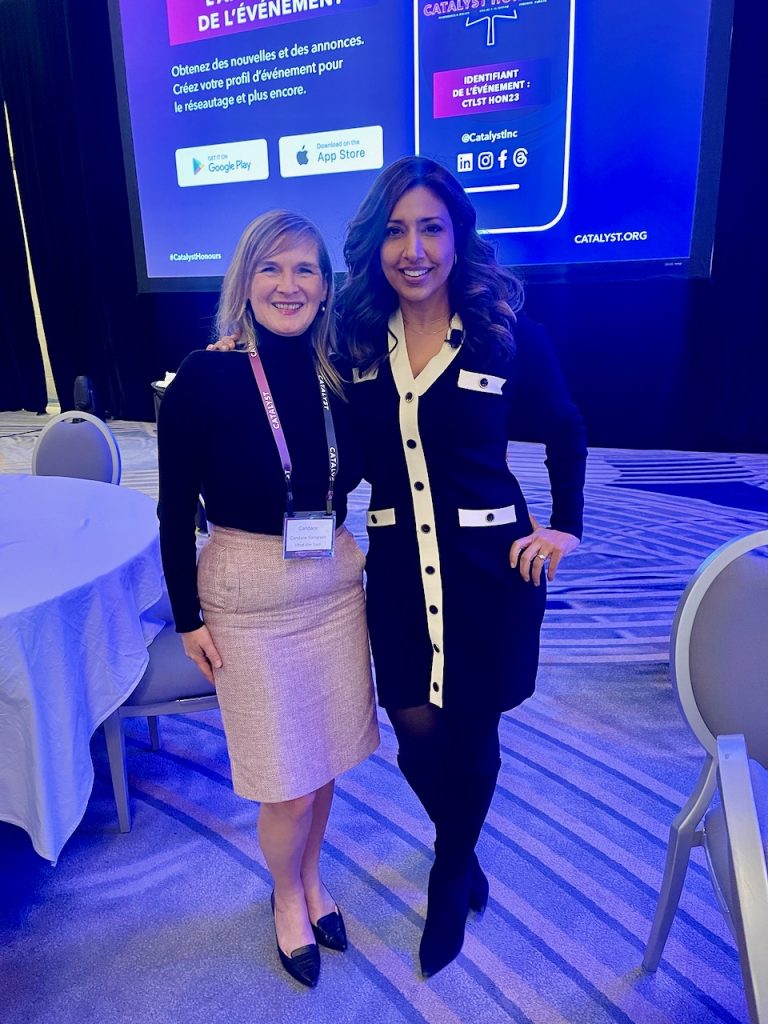
Three key moments from the event particularly resonated with me:
- “Spend Your Power” from David Simmonds: This powerful statement was a call to action for those privileged enough to navigate life without daily micro-aggressions. It reminded me that we have the power to effect positive change, especially those of us with platforms and influence. As a white woman with an audience in Canada, it was a poignant reminder of my responsibility to use my position for the greater good.
- Linda Hasenfratz on Positive Change and Inclusion: Linda Hasenfratz’s insights were a masterclass in the power of positive framing. She challenged the typical focus on negative statistics, using a headline about women in the workplace as an example. While it’s easy to fixate on the fact that “1 in 5 Women are the only woman in the room at work,” Linda highlighted the more encouraging reality: for 4 out of 5 women, this is not their experience. This shift in perspective is not just about being optimistic; it’s about driving change. By celebrating the progress of the majority, we put pressure on the minority to adapt. Linda poignantly noted, “nobody wants to be the last on the bus.” This approach suggests that change is often more effectively achieved not through confrontation, but by highlighting the risk of being left behind in a rapidly evolving, inclusive world.
- Amy Hanen on Respectful Language: During the panel “From Flags to Fulfillment: Failing Forward on 2SLGBTQ+ Workplace Inclusion to Advance Concrete Change,” Amy emphasized the importance of getting the 2SLGBTQ+ acronym right. Unlike nostalgic misnomers like referring to the Rogers Centre as the Skydome, inaccuracies in this context can be hurtful. It’s crucial to learn, relearn, and ask for help if needed, but never dismiss it with a ‘whatever’. This principle applies broadly: it’s okay to be uninformed, but it’s not okay to be dismissive or intentionally harmful.
These insights from the Catalyst event are vital steps towards furthering women’s empowerment in the workplace. What is shared and amplified at these events are beacons guiding us towards a more inclusive, understanding, and progressive professional world.
Why Catalyst Matters
In reflecting on the myriad insights and stories shared at the Catalyst Honours event, it becomes clear that the journey towards a more inclusive and equitable workplace is not just a collective effort, but also a deeply personal one. Each of us, in our unique roles and with our individual experiences, holds the potential to be a catalyst for change.
Whether it’s by embracing vulnerability in leadership, as we saw on stage, or by shifting our perspectives to focus on progress and inclusion, like Linda Hasenfratz advocated, we all have the power to make a difference. It’s about using our voices, our positions, and our actions to create ripples of positive change in our professional environments and beyond.
The event was a vivid reminder that being a catalyst isn’t about grand gestures or sweeping reforms alone; it’s about the everyday choices we make, the conversations we engage in, and the attitudes we foster. From the way we address and respect diverse identities, as Amy Hanen highlighted, to how we ‘spend our power’ for the betterment of others, as David Simmonds urged, each action contributes to a larger movement towards a more inclusive and empowering workplace.
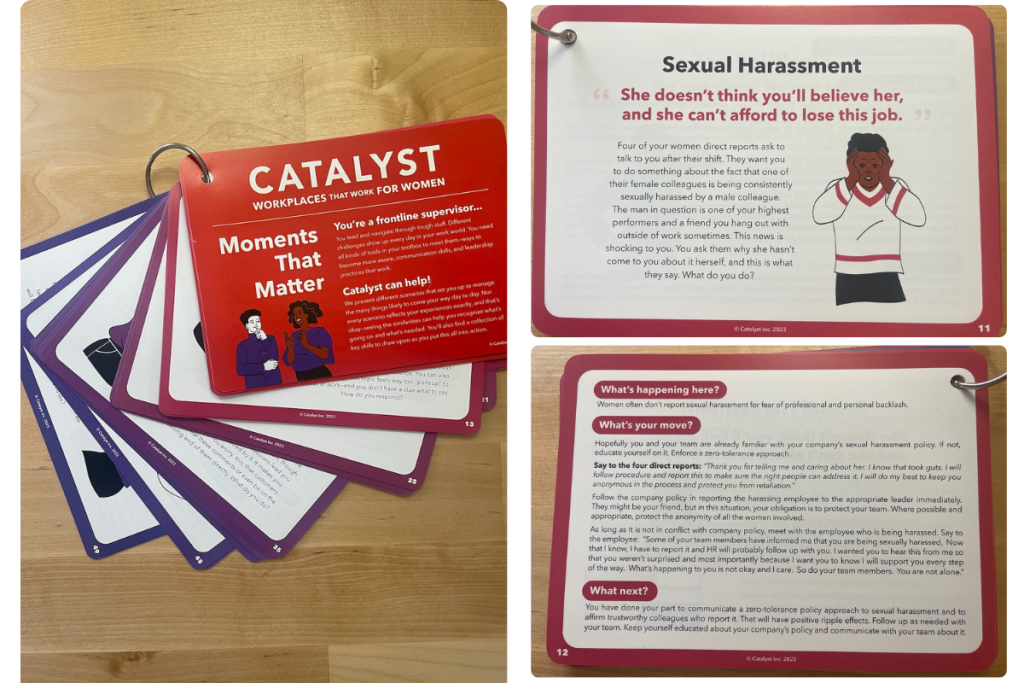
As I left the event, I was filled with a renewed sense of purpose and a deeper understanding of my role in this journey. We all can be catalysts in our own right, driving change and fostering environments where everyone feels valued, heard, and empowered. The Catalyst Honours event underscored the ongoing need for women’s empowerment in the workplace, reminding us that every individual has a role to play in this vital movement.
